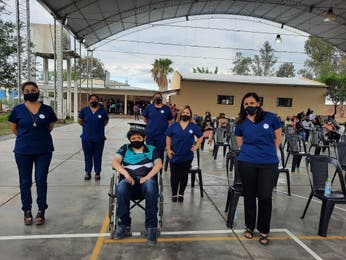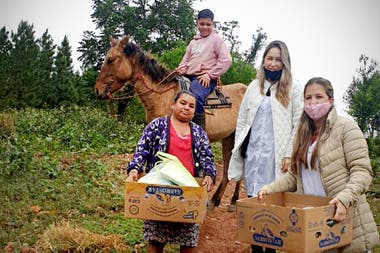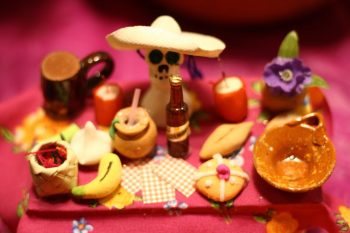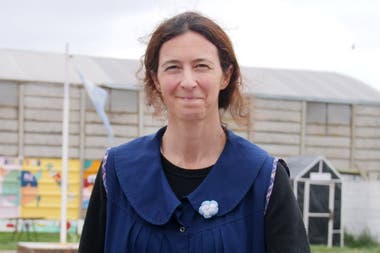
With the arrival of the pandemic and distance classes, Professor Claudia Distéfano reconfirmed the importance of emotional containment at the time of teaching, something that he had already been putting into practice in the classrooms with very good results. “I can’t work, or pretend that a student learns a specific content, if I don’t know before what’s going on through his head, if I don’t know what things are interesting to him, importing or hurting “, he summarizes. And he says that, in virtuality, this demand for listening increased because” boys and girls are having a hard time “and today” the priority is to maintain the link. ”
Claudia teaches Physics and Chemistry at the only secondary school in María Ignacia Vela, a Rural town 50 kilometers from Tandil, where less than 2000 people live, surrounded by a landscape of dairy farms and silos. In its two shifts, the Rural School of Secondary Education No. 5 Sargento Cabral has about 200 students and they all know each other. “That can be an advantage or a difficulty,” says the teacher, “since adolescents often bring previous stories to school, of conflicts between families or of marked social differences.” Therefore, until the Covid-19 interrupted daily life, one of the main problems of young people was bullying and rivalry between groups.
In search of a solution, the teachers started projects to strengthen teamwork and, along with the harder content, to focus on social-emotional skills. Thus was born the idea of make biogas -a fuel gas based on organic waste-, developing a method that in the future could be put into practice by the residents of Vela with fewer resources. The proposal, which in 2019 was the winner of the La Nación Foundation for Education Award, included research and the creation with homemade elements of a prototype of a biodigester -a device to produce biogas- and the assembly of an orchard of aromatic and medicinal plants.
Claudia is proud of what they achieved last year thanks to the biodigester group, not only at an educational level, but above all because of what happened with the students of different years who participated. One of the changes Camila Sosa (17), a young woman who is now in 6th grade, experienced it deeper. year. Claudia uses her as an example of how, by listening to the children and integrating them into something that excites them, a difference can be made. “It exceeded all my expectations,” says the teacher proudly.
Camila was very introverted and had socialization problems. She was a silent student, one of those who are located at the back of the classroom and in a corner to avoid being detected. But today she leads the project. “She helped me participate more in classes, to give me confidence and to be better with my classmates, “Camila said last year, when she was in 5th year and the school won the award given by LA NACION.” They charged me a lot, “she recalled. Because of my body, which is big, they called me King Kong and all that stuff. I would come home curled up, angry. ”
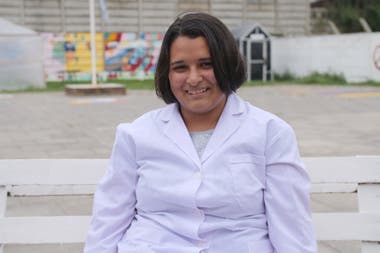
Camila Sosa is one of the students participating in the biodigester project that won the La Nación Foundation for Education award in 2019 Credit: La Chispa Film
Claudia remembers that, as the months went by, Camila learned to hear the other without feeling attacked, and their colleagues, to respect her and exchange opinions without aggression. That same confidence that she gained also allowed her to talk to her teacher about some personal problems she was going through that she hadn’t been able to tell anyone about.
This year, for the suspension of face-to-face classes and the impossibility of the day to day, they had to completely rethink the project. Claudia explains that “the modality changed 100%” but that they are trying to continue it. Camila took the biodigester prototype home – so she could “feed” it and do the tests – and reassembled it with the help of her father, Luis. “It is impressive how she made that commitment,” says the teacher. Together with Claudia and the rest of the team of students, they are still connected by a WhatsApp group and they managed to add boys from other years, in different roles. For example, some are concerned with networks and others with further researching new possibilities.
Regarding the vegetable garden, which was the second part of the biodigester project, they decided that a group of students take the seedlings, take care of them in their homes and investigate their properties. When possible, they will be transplanted into the school greenhouse.
Another issue that greatly concerns Claudia is educational continuity. On the one hand, prior to Covid-19, they already had to redouble their efforts to achieve permanence, because many of the students do not think about continuing their studies but about finishing to go to work in the fields with their parents. That is, at the first misstep, they abandoned. It is something that they had managed to overcome, but this year, with the absence of presence, it becomes a real threat.
Therefore, when a boy does not appear or does not answer, Claudia takes care of calling them And see what happen. That is your thermometer. “How are we going to get back these girls and boys that we could not sustain in content?” He asks. From their gaze, the key is to “hold them emotionally, so that next year come back to school. “The content became secondary:” What they did not learn is something that can be recovered, the goal is not to lose them, not to leave school, “he emphasizes.
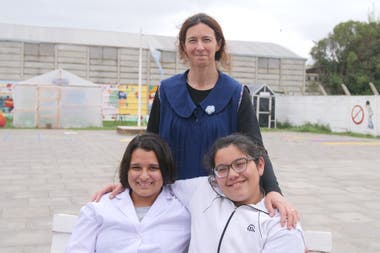
He knows that it is not easy and remarks that in the virtuality something essential is lost, which is the cross-examination, the going back and forth. “As much as we make videos, audios and virtual classes, as not everyone has access to the Internet, it is difficult,” he explains. There are families that have only one cell phone and do not have a computer, parents work with the same devices or have more than one child. The school gives these students booklets and the printed activities.
When in October 2019 LA NACION traveled to Vela to meet the winning biodigester project, Camila, with great shyness, said something that sums up what teaching work can achieve: “Claudia is like my second mother, he was next to me. It helped me with my problems, it helped me to talk about things that happened to me, things that I had not been able to tell anyone and it gave me confidence “.
More information
La Nación Foundation Award for Education: Organized by Fundación La Nación together with Banco Galicia and Osde, it launched its 14th edition with the support of Cimientos, Proyecto Educar 2050, VIACOM-CBS, Fundación Varkey, Enseñá x Argentina and the University of San Andrés . This year, the aim is to highlight the incessant work of teachers who during the pandemic develop innovative pedagogical strategies to ensure the educational continuity of their students in vulnerable contexts. The application is open until October 2, 2020 and only initiatives that have been developed in the context of the pandemic can be submitted. Among the participating schools, three winners will be selected who will receive 300,000 pesos each and, also, three special mentions will be awarded that will receive 100,000 pesos each to invest in the training of the teachers involved and the equipment of the school to facilitate access to the Communication technologies. More information: write to [email protected] or call the cell phone: 11-4915-9533. Terms and conditions.
Publicado en el diario La Nación

